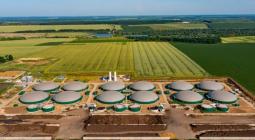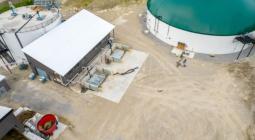“The [Biogas] unit is benefiting us inside the house and in the field. It has reduced our consumption of butane cylinders. I used to buy four cylinders a month, each for EGP170 (3.3 US dollars). Today, I buy only one cylinder a month. Hence, the unit is making me save around EGP 500 a month (9.8 US dollars). The unit also provides me with organic fertilizers that I use in the field to nourish my potato crop,” Eissa explains.
Interest in the use of biogas as a clean alternative to fossil fuels is on the rise. But for experts, Egypt is yet to maximise its potential in the field.
Ahmed Medhat, a former executive director of Egypt’s Bioenergy Association for Sustainable Development, “so far, we have no more than 5,000 household biogas units, which represents only half a percent of Egypt’s potential.''
''There are many reasons for that, including a funding shortage. We also need a comprehensive system to raise awareness among people about the importance of biogas units and how they help solve Egypt’s energy issues,” Medhat adds.
The International Energy Agency has predicted that biogas production will increase by 32% between 2023-2028.





